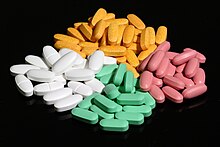User:Foodsciencefanatic
| This is a Wikipedia user page. This is not an encyclopedia article or the talk page for an encyclopedia article. If you find this page on any site other than Wikipedia, you are viewing a mirror site. Be aware that the page may be outdated and that the user whom this page is about may have no personal affiliation with any site other than Wikipedia. The original page is located at https://en.wikipedia.org/wiki/User:Foodsciencefanatic. |
Digestive Enzyme Supplements
[edit]Digestive enzymes are enzymes in the body that facilitate chemical reactions for the breakdown of food into nutrients for the body and waste through the digestive tract. These enzymes are necessary for proper digestion and absorption. Lack of these enzymes could lead to serious medical illnesses such as arthritis, irritable bowel syndrome, heartburn, and chronic fatigue syndrome. It could also mean a lifetime of obesity. When food is cooked and processed these enzymes are denatured. Ideally all enzymes in the food are ruptured at a temperature of 118-129 degrees celsius. This means when cooked and processed food enters the stomach, besides the enzymes in our saliva (ie. amylase), the food is free of enzymes. The endocrine system and pancreas is stressed to gather the enzymes from reserves in the body in order to properly digest the food. Digestive enzyme supplements can be taken in this case to ease the stress on the pancreas and the rest of the body while allowing good digestion to lead a healthy life. The body naturally produces some digestive enzymes, but most of the digestive enzymes in the body result from from the consumption of raw food. Ageing tends to decrease the amount of digestive enzymes in the body. To prevent this people usually take supplements of these enzymes so that their bodies can still produce the nutrients necessary for cell growth, repair and to carry out other functions.[1]

Photo by <a href="http://ragesoss.com">Sage Ross</a>, <a href="http://creativecommons.org/licenses/by-sa/3.0/deed.en">CC by-sa<a>
Short-Term Benefits
[edit]- Complex carbohydrates will be fully digested with the supplements, this should decrease chances of bloating and gas
- Aid in the breakdown of fat, proteins and carbohydrates
- Improved digestion of dairy products that contain lactose
- Decrease in heartburn or any indigestion that results from gastric acid in the stomach
- Lessening of food allergies due to complete breakdown of food
- Increased energy levels since there are more nutrients to go around in the body
- Diminishing of ulcers as these enzymes do pre-digestion prior to actual digestion so less acid is required[2]
Which Enzymes Should You Use?
[edit]- Proteases-(enzymes that break down proteins) such as Papain which is from papaya, it can be used as a meat tenderizer as well
- Amylase-to digest carbohydrates and starchesfor proper utilization by cells
- Lipase-to digest fats
- Cellulase-to break down cellulose in fruits vegetable, grains and seeds into smaller units
- Lactase-to break down lactose (a milk sugar) into glucose and galactose
- Bromelain-An enzyme from pineapples that digests proteins and burns 900 times its own weight in fat. It can reduce inflammation and swelling in joints if it is released into the bloodstream
- Invertase-to help digest sucrose for proper utilization by cells
- Amylase-to aid in the digestion of starch[3] [4]
Supplementation of Pancreatic Enzymes
[edit]- Pancreatic enzymes are secreted in pancreatic juice in the duodenum during digestion, lack of these enzymes inhibits breakdown of proteins, carbohydrates and fats
- Chymotrypsin, trypsin, pancreatin, pancrelipase are mainly extracted from porcine (pig) or bovine (cattle) sources and used in pancreatic supplementations. Lipase can be extracted from microbial sources, for example Aspergillus oryzae and Rhizopus arrbizus
- Activity and concentration of these enzymes is dependent on the animal’s species, age, sex and husbandry practices
Microbe-Derived Enzyme Preparations
[edit]- Extraction of microbe-derived enzymes from synthesized fungal sources include lipase, lactase, amylase, cellulase and protease.
- Can benefit in treatment of malabsorption, steatorhhea, and chronically obstructed arteries
- Lipase is extracted from Aspergillus oryzae, which has been used in the fermentation of soybeans in the production of soy sauce, tamari, and miso.
Plant-Based Enzyme Preparations
[edit]Sources of such enzymes are plants as the name suggests. Examples include Bromelain from pineapples, and Papain from papaya.
Bromelain
[edit]- Bromelain is a general name for the family of slfhydryl-containing, proteolytic enzymes. Comes from pineapple fruit and stem. Contains a peroxidase, acid phosphatase, several protease inhibitors, and organically-bound calcium.
- Bromelain is an anti-inflammatory agent and is used in wound debridement
- A common use of Bromelain is as an aid of protein digestion.
Papain
[edit]- Papain is a dried latex from papaya fruit
- It is a complex of enzymes that have proteolytic, amylolytic, and weak lipolytic activity.
- Papain aids in protein digestion
- It provides relief from the symptoms of episiotomy and treatment of herpes zoster[5]
References
[edit]- ^ Roxas, Mario (2008). "The Role of Enzyme Supplementation in Digestive Disorders". Alternative Medicine Review. 13 (4): 307–314.
{{cite journal}}:|access-date=requires|url=(help) - ^ Barron, Jon. "The Enzyme Story". The Baseline of Health Foundation. Retrieved 8 March 2013.
- ^ Barron, Jon. "The Enzyme Story". The Baseline of Health Foundation. Retrieved 8 March 2013.
- ^ Tweed, Vera. "Top 10 Digestive Enzymes". Cruz Bay Publishing, Inc. Retrieved 8 March 2013.
- ^ Roxas, Mario (2008). "The Role of Enzyme Supplementation in Digestive Disorders". Alternative Medicine Review. 13 (4): 307–314.
{{cite journal}}:|access-date=requires|url=(help)
